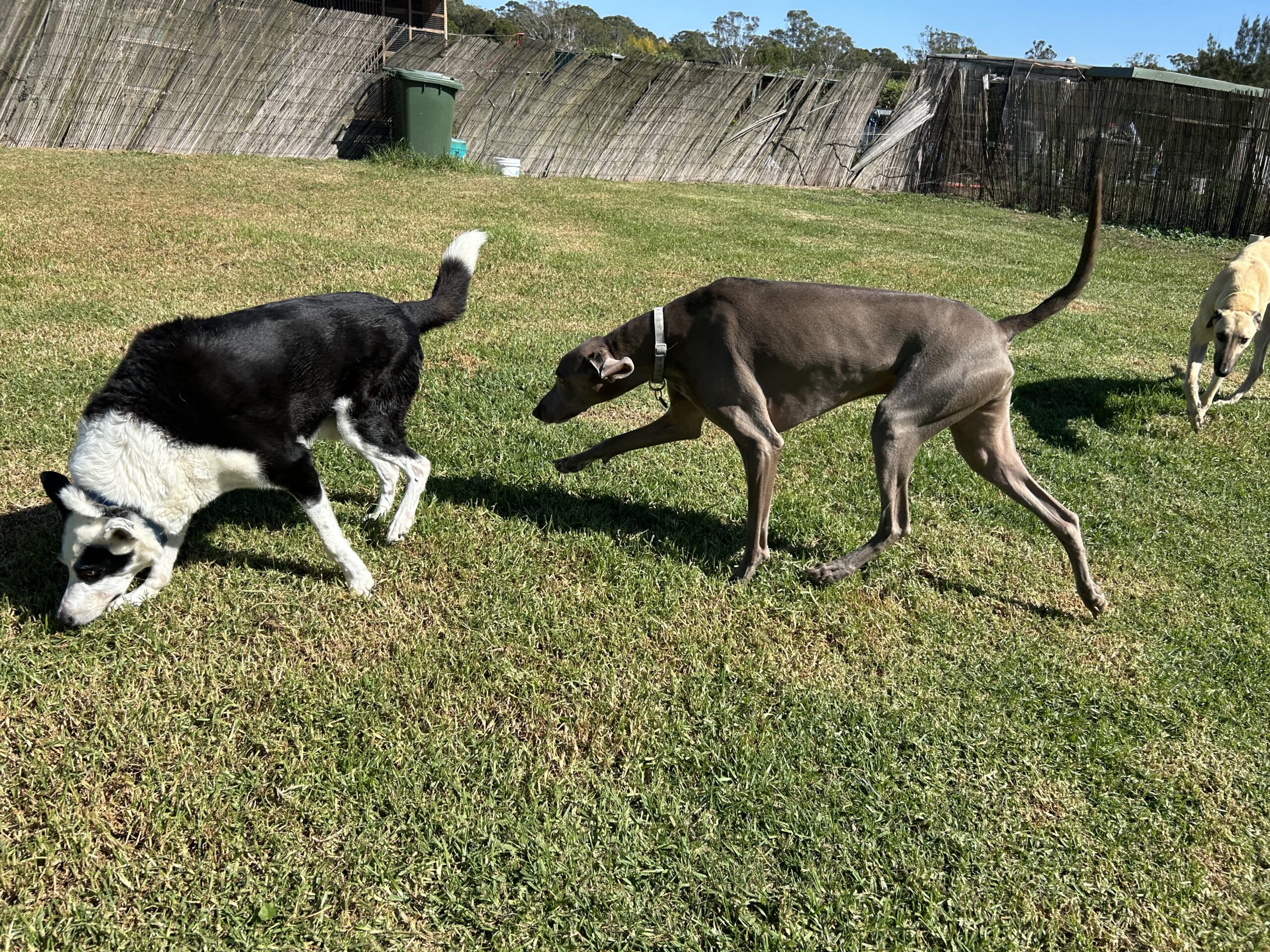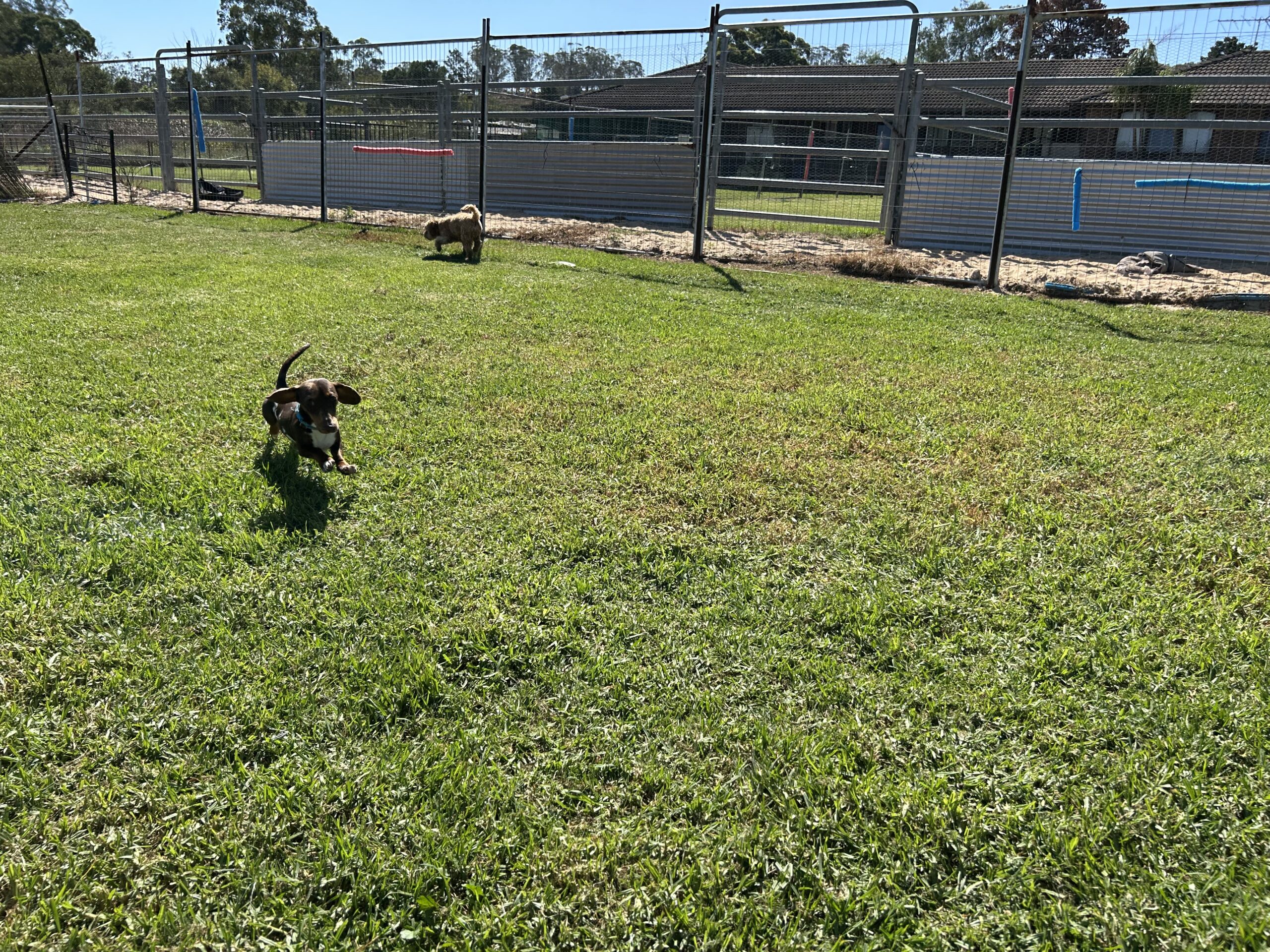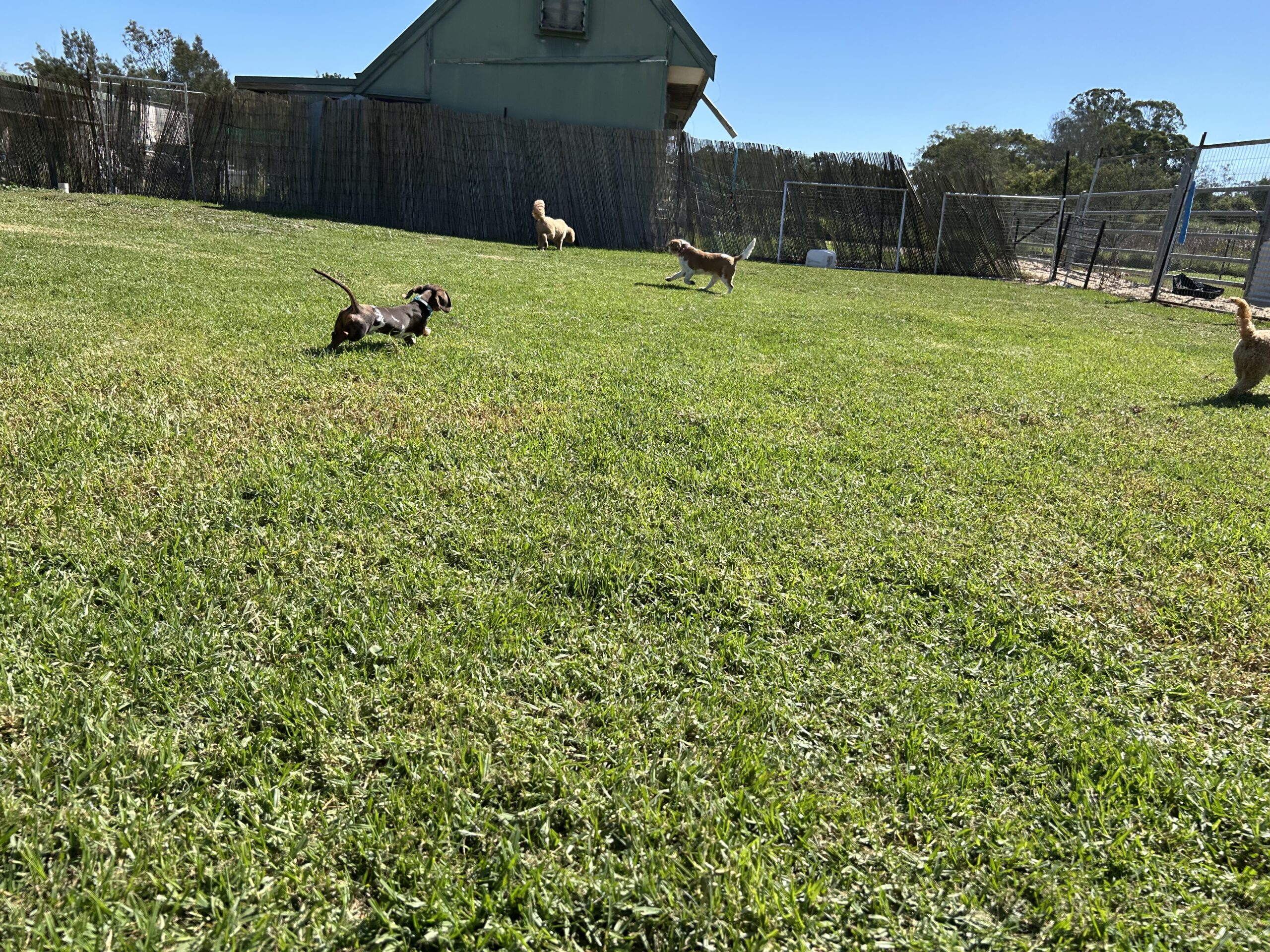Senior Dog Overnight Boarding: Complete Care Guide
Key Takeaways 
- Senior dogs require specialized overnight boarding with additional medical monitoring and comfort accommodations
- Look for facilities with 24/7 staff supervision and experience handling older pets
- Regular boarding can benefit senior dogs by providing mental stimulation and social interaction
- Prepare detailed care instructions including medication schedules, dietary needs, and mobility limitations
- Visit potential facilities in advance to ensure they can properly accommodate your senior dog’s specific needs
- Consider luxury dog boarding options for maximum comfort for your elderly pet
Senior Dog Overnight Boarding
Understanding Senior Dog Boarding Needs
Senior dogs aren’t just older versions of their younger selves. They face unique challenges that call for specialized care during overnight stays. Dogs in their golden years often battle arthritis, hearing loss, vision problems, or cognitive changes that make standard boarding less suitable. Their bodies regulate temperature less effectively, and many take daily medications that must be administered on precise schedules.
Finding the right boarding facility becomes crucial when you own an elderly canine companion. The best facilities for senior dogs offer quieter sleeping areas, orthopedic bedding, and staff trained to recognize subtle signs of discomfort or distress. These accommodations aren’t luxuries—they’re necessities for maintaining your dog’s health and happiness during your absence.
Experts recommend facilities with 24-hour supervision for senior pets. This constant oversight ensures medication remains on schedule and any emerging health issues receive immediate attention. A quality senior dog boarding facility understands that what works for a two-year-old Labrador won’t necessarily serve an eleven-year-old Shih Tzu.
Preparing Your Senior Dog for Overnight Boarding
The preparation process makes all the difference in your senior dog’s boarding experience. Start by bringing familiar items from home—their bed, favorite toys, or a blanket with your scent. These comfort objects help reduce anxiety and provide continuity in an unfamiliar environment.
Create a detailed care plan for facility staff. This document should outline:
- Complete medication schedule with dosing instructions
- Feeding routine and food sensitivities
- Mobility limitations and assistance needs
- Bathroom schedule and any incontinence issues
- Behavioral quirks or anxiety triggers
- Signs that indicate pain or distress in your specific pet
Most senior dogs benefit from a “trial run” before longer stays. Book a single overnight visit to assess how your dog responds to the facility. This short stay helps identify potential problems without the stress of an extended separation.
Consistency matters tremendously for older dogs. If your senior pet already attends doggy daycare at the same facility, they’ll likely adapt better to overnight boarding there. The familiar environment and staff relationships provide security during your absence.
Selecting the Right Boarding Facility for Your Elderly Pet
Not all boarding facilities provide adequate care for senior dogs. When researching options, prioritize places with specific senior dog programs or dedicated quiet areas away from energetic younger dogs. The best facilities maintain detailed logs of each senior pet’s activities, medication administration, food intake, and bathroom habits.
Staff qualifications matter significantly when boarding older pets. During facility visits, ask direct questions about their experience with:
- Administering various medication types
- Handling mobility-impaired animals
- Recognizing pain signals in senior dogs
- Managing common senior health emergencies
Physical facility features also impact your dog’s comfort. Look for:
- Slip-resistant flooring to prevent falls
- Climate-controlled spaces with consistent temperatures
- Raised food and water bowls for easier access
- Ramps or steps to help with getting in/out of resting areas
- Outdoor spaces with gentle terrain for limited mobility
The best dog boarding facilities for senior pets often offer additional services like regular grooming to maintain comfort and cleanliness. This integrated approach ensures all your pet’s needs receive attention during their stay.
Health Monitoring and Medication Management
Medication management ranks among the most critical aspects of senior dog boarding. Quality facilities implement rigorous medication protocols, including:
- Locked storage of all pet medications
- Detailed administration logs with timestamps
- Staff trained in various administration methods
- Emergency procedures for missed or refused medications
- Systems for monitoring effectiveness and side effects
Beyond medication, senior-focused facilities conduct regular health checks throughout the day. Staff should assess:
- Activity level and energy
- Appetite and water intake
- Stool consistency and urination patterns
- Breathing rate and quality
- Mobility changes
- Pain indicators specific to your dog
Many overnight dog boarding facilities now offer remote monitoring options. These services allow you to check on your pet through secure video feeds or receive regular text updates with photos. This transparency provides peace of mind and lets you address any concerns promptly.
Discuss emergency protocols before booking. The facility should have relationships with local veterinarians and clear guidelines for when to seek immediate medical attention. They should also maintain current copies of your dog’s medical records and veterinary contact information.
Special Accommodations for Senior Dog Comfort
Comfort becomes increasingly important as dogs age. The best boarding facilities recognize this reality and provide specialized accommodations to ease joint pain, reduce anxiety, and support overall wellbeing during overnight stays.
Quality senior dog boarding facilities offer:
- Orthopedic bedding with adequate padding
- Heated sleeping areas to ease joint stiffness
- Private spaces away from loud, high-energy environments
- Non-slip mats throughout living and walking areas
- Elevated feeding stations to reduce neck strain
- Access to gentle exercise options suited to limited mobility
Many senior dogs benefit from structured routines that mirror their home schedule. Top facilities work with owners to maintain consistency in feeding times, bathroom breaks, medication administration, and sleep schedules. This predictability reduces stress and supports cognitive health in older dogs.
Specialized personal care dog boarding options often include therapeutic services beneficial to senior pets. These might include:
- Gentle massage therapy to improve circulation
- Warm towel treatments for arthritic joints
- Assisted short walks on appropriate terrain
- Passive range-of-motion exercises
- Mental stimulation activities matched to cognitive abilities
The most comprehensive senior dog boarding programs incorporate regular grooming during longer stays. These services help maintain skin health, prevent matting, and identify any developing skin issues early.
Benefits of Specialized Senior Dog Boarding
Despite common assumptions, many senior dogs actually thrive with occasional boarding experiences. Proper boarding provides mental stimulation, gentle socialization, and a change of environment that helps prevent cognitive decline. For dogs already showing signs of cognitive dysfunction, the structured environment of quality boarding can provide comforting predictability.
Professional boarding eliminates the disruption that can occur with in-home pet sitting, where changing caregivers might confuse senior pets. It also ensures experienced eyes monitor your dog constantly, catching subtle health changes that might otherwise go unnoticed.
Regular, brief boarding stays can prepare older dogs for longer separations when necessary. By establishing familiarity with the facility and staff, these “practice” visits reduce anxiety during extended stays. Many seniors develop positive associations with boarding facilities that provide appropriate care and attention.
For multi-pet households, specialized senior boarding offers aging dogs a break from more energetic younger housemates. This respite can reduce stress and allow for rest that might be difficult to achieve at home. Many owners report their senior dogs return home with improved energy and mobility after quality boarding experiences.
Nutrition and Feeding During Senior Dog Boarding
Dietary consistency remains essential for senior dog health during boarding stays. Quality facilities accommodate special diets, feeding schedules, and unique nutritional needs without additional charges. They understand that dietary changes can trigger digestive upset or exacerbate existing health conditions in older pets.
The best boarding options for senior dogs offer:
- Secure storage of special foods and supplements
- Precise portioning based on owner instructions
- Careful monitoring of food and water intake
- Hand-feeding assistance for dogs with dental issues
- Elevated dishes for dogs with mobility limitations
- Medication administration with food when required
Hydration requires particular attention in older dogs. Senior-focused facilities employ strategies to encourage adequate water consumption, including:
- Multiple water stations throughout living areas
- Regular refreshing of water bowls
- Flavoring water when appropriate for reluctant drinkers
- Monitoring for changes in drinking patterns
- Adding water to food for additional hydration
- Ice cubes as treats for dental comfort and hydration
Many senior dogs benefit from smaller, more frequent meals rather than one or two larger feedings. Quality boarding programs accommodate these specialized feeding schedules without additional fees, recognizing them as health necessities rather than luxuries.
Returning Home: Post-Boarding Care for Senior Dogs
The transition home after boarding requires thoughtful management for senior dogs. Even the best boarding experiences create some disruption to routine, and older dogs often need adjustment time. Plan for a quiet homecoming without immediate visitors or activities to allow for rest and reorientation.
Watch for subtle changes in the days following boarding:
- Shifts in sleeping patterns
- Changes in appetite or water consumption
- Increased clinginess or unusual independence
- Temporary regression in house training
- Signs of joint stiffness or mobility changes
- Digestive irregularities
Most senior dogs return to normal patterns within 24-48 hours. Maintain consistency in medication schedules, feeding times, and exercise routines to facilitate this adjustment. If you notice concerning changes that persist beyond two days, consult your veterinarian.
Quality holiday dog boarding facilities provide detailed reports of your dog’s stay, including medication administration, eating habits, activity level, and social interactions. Review this information to understand your pet’s experience and identify any areas that might need adjustment for future boarding.
Frequently Asked Questions
At what age is a dog considered “senior” for boarding purposes?
Most facilities classify dogs as seniors around 7-8 years for larger breeds and 10-11 years for smaller breeds. However, individual health status matters more than chronological age when determining appropriate boarding arrangements.
How far in advance should I book senior dog boarding?
Book senior dog boarding at least 3-4 weeks ahead for regular stays and 2-3 months ahead for holiday periods. Facilities with specialized senior programs often have limited space and fill quickly, especially during peak travel seasons.
Can my senior dog stay in the same area as my younger dog during boarding?
This depends on your dogs’ relationship and the older pet’s needs. Many facilities allow bonded pairs to stay together but might separate them during certain activities to ensure the senior dog isn’t overwhelmed.
What if my senior dog refuses medication during boarding?
Quality facilities employ various techniques for medication administration, including hiding pills in treats, using pill pockets, or gentle manual administration. They should contact you if persistent refusal occurs to discuss alternatives.
How often will my senior dog be taken outside during overnight boarding?
Most senior-focused boarding facilities provide bathroom breaks every 4-6 hours, including overnight for dogs with incontinence issues. Discuss your pet’s specific needs when booking to ensure appropriate scheduling.
Should I bring my senior dog’s bed from home?
Yes! Familiar bedding provides comfort and security for senior dogs in new environments. Most quality facilities welcome items from home that help reduce anxiety and improve sleep quality.
What happens if my senior dog needs veterinary care during boarding?
Reputable facilities maintain relationships with local veterinarians and emergency clinics. They should obtain your authorization preferences before boarding and have clear protocols for both routine and emergency medical situations.
Is luxury dog boarding worth the extra cost for senior pets?
Many senior dogs benefit significantly from the additional amenities in luxury boarding, including more comfortable bedding, quieter environments, and increased staff attention. For dogs with medical needs or anxiety, these settings often reduce stress considerably.
For more boarding tips visit: Facebook: Canine Boarding Lodge
For more grooming tips visit: Facebook: Canine Glamour Instagram: Canine Glamour TikTok: Canine Glamour




